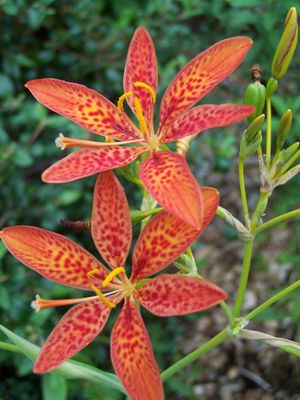Printed at http://www.quackingrassnursery.com/index.cfm/
Belamcanda chinensis
Blackberry Lily
Plant Type:
SUN PERENNIALSBelamcanda chinensis - Blackberry Lily's tall stems are topped with six-petaled flowers that open red to red-orange commencing in late July in northeastern Connecticut, the bloom period lasting through August. As the day wears the early morning red metamorphoses to deep orange. Replete with darker red-orange to red-purple spotting and gold highlights they unfurl from missile-shaped buds. This spotting has birthed another common name: Leopard Lily. Alternating broad green sword-shaped leaves elongate as the flowering stems grow taller. These leaves look iris-like; indeed, they betray Blackberry Lily's allegiance to the Iridaceae. Blackberry Lily refers to the seed heads which really do resemble large, glossy blackberries which bob in autumn breezes and look spectacular with late blooming daylilies and warm season grasses. Full to mostly sunny siting planted in any average to fertile soil. We have them self-sowing in our sand path in the Autumn Garden! Established seed grown potted plants.
On August 1, 2021 I watched a black swallotail butterfly float and gently touch down from flower to flower for many minutes. It was yet another quiet, beautiful garden joy.
Characteristics and Attributes for Belamcanda chinensis
Season of Interest (Flowering)
- Summer
Season of Interest (Foliage)
- Spring / Summer
Autumn Interest
- Fruit / Berries / Seed Heads
Nature Attraction
- Deer Resistant
- Butterflies
Light
- Full Sun
Attributes
- Border
- Drought Tolerant
- Natural Garden
- Massing
Growth Rate in the Garden
- Moderately Fast
Soil
- Sandy
- Draining
- Adaptable
- Average
- Fertile
Origins
- East Asia
Propagated By
- By Seed / Potted



